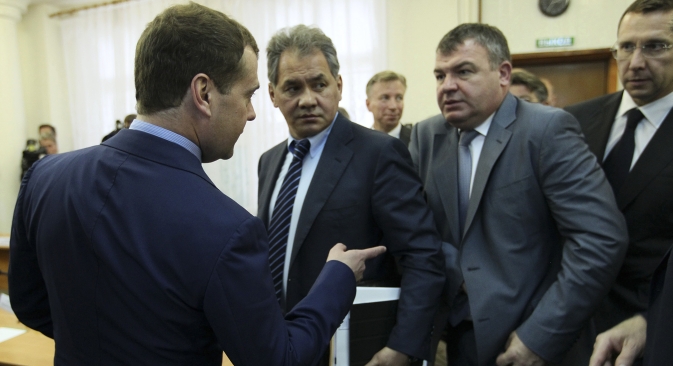Putin’s anti-corruption campaign begins to bite

Dismissed Defense Minister Anatoly Serdyukov (second right) came under scrutiny over questionable contracts. Source: Reuters
In November, the Kremlin’s anticorruption drive went up a gear when Defense Minister Anatoly Serdyukov was fired amid an investigation into the misappropriation of $97 million worth of state assets.
Serdyukov’s dismissal was a serious escalation in the Kremlin’s efforts to tackle the endemic graft that has been getting worse in recent years. In November alone, the authorities initiated several high profile anticorruption actions, including arrests, investigations and sackings of senior officials and bosses of state-owned enterprises.
Related:
State Duma deputies on the anti-corruption warpath
New anti-corruption bill may hit civil servants
Corruption costs the Russian state hundreds of billions of dollars a year, by some estimates – money it can no longer afford to lose.
A tidal wave of petrodollars has meant the government could previously turn a blind eye to much of the stealing, but since the 2008 crisis economic growth has slowed, to an estimated 2.2 percent in the fourth quarter of 2012. The country’s twin trade and budget surpluses are also expected to evaporate in the coming years, despite the fact that oil remains at over $100 a barrel.
Boris Titov, the presidential commissioner for entrepreneurs’ rights, argues that the torrent of cash flowing into the state’s coffers is actually responsible for the growth of corruption. Russia went from a mid-80s ranking on Transparency International’s Corruption Perception Index to a peak of 154 in 2010, out of 182 countries.
During his 2008-12 term in office, then-President Dmitry Medvedev launched the first concerted crackdown on graft. The tide was apparently turned, as Russia fell to 143 in the Transparency ranking in 2011 and again to 133 in November 2012 (but a change in methodology means the last result can’t be directly compared).
After Putin’s reinauguration last May, the Kremlin stepped up its anticorruption efforts, with a series of laws to increase the transparency of government.
In late October, Dmitry Gudzhoyan, the CEO of MRSK, a state electricity firm, was sacked after an investigation into its procurement deals revealed suspected kickbacks to company insiders. The investigation was ordered by Deputy Prime Minister Arkady Dvorkovich.
“Dvorkovich ordered that the facts be checked and – if they were confirmed – asked the company to ‘make staffing decisions at the corporate level,’” says Vladimir Skylar, a utilities analyst with Moscow investment bank Renaissance Capital.
The same week, ex-Agricultural Minister Yelena Skrynnik was called in by the Interior Ministry for questioning after she was linked in a state TV documentary to a $1.3 billion fraud while running RosAgroLeasing, where she worked before becoming a minister in 2009. Skrynnik has denied the charges and threatened to sue the TV station.
Then in November, Yury Urlichich, the designer of satellite navigation system Glonass, Russia’s answer to GPS, was fired amid allegations that $200 million had been embezzled. Two weeks later he stepped down as CEO of Russian Space Systems, a key Glonass contractor.
The same month, the head of Rosavtodor, the state agency in charge of Russia’s road system, was sacked over the alleged misuse of state funds, while the home of Alexander Provotorov, the CEO of the state fixed-line telecoms operator Rostelecom, was raided by police in a graft investigation.
And finally that month, the first arrests were made over the misuse of funds allocated for the Asia-Pacific Economic Cooperation summit, which Russia hosted in Vladivostok in September. The government invested over $20 billion into fancy new infrastructure for the Pacific port, including a state-of-the-art $1 billion suspension bridge. Officials are suspected of creaming off millions in backhanders and other scams.
One senior Moscow banker says the anticorruption crackdown could well be for real.
“I know that all of this could be mainly noise from the local press, but firings and arrests have taken place, so it’s not purely noise,” he says, speaking on condition of anonymity.
The state has also begun to institutionalize its antigraft measures.
A year ago, Putin forbade state-owned companies in the power sector to subcontract companies where the ultimate beneficial ownership was not known.The government has also passed laws forcing members of parliament and state officials to declare their incomes and assets. And similar laws have been passed for state enterprises.
All rights reserved by Rossiyskaya Gazeta.
Subscribe
to our newsletter!
Get the week's best stories straight to your inbox